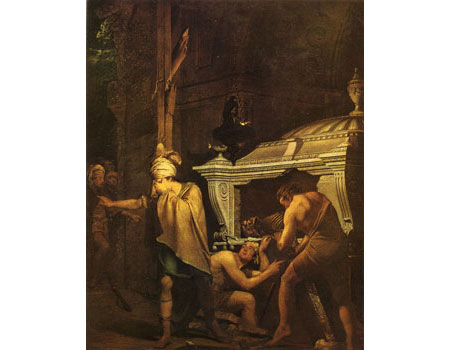 I should insert two warnings: first, that I will be discussing some definite SPOILERS to the film, though I will try to keep the worst ones to a comment to follow immediately upon this, so casual readers won't be surprised. Second, that this more or less constitutes a rant. One final caveat: I have not read McCarthy's novel, so I will make no reference to or comparison to that text. I suspect it may work rather differently -- and as a medium, may be more amenable to telling this particular story -- but I don't know.
I should insert two warnings: first, that I will be discussing some definite SPOILERS to the film, though I will try to keep the worst ones to a comment to follow immediately upon this, so casual readers won't be surprised. Second, that this more or less constitutes a rant. One final caveat: I have not read McCarthy's novel, so I will make no reference to or comparison to that text. I suspect it may work rather differently -- and as a medium, may be more amenable to telling this particular story -- but I don't know.Let me say a few good things: the cast is mostly quite good. I would not have sat through this film had not Mortensen been his usual engaging self. The bleak world is convincingly rendered visually; in fact at one point I thought, "What a nightmare set dressing must have been!"
Let me also get off my chest that in the credits one finds the most incredibly fatuous, self-inflating, pretentious credit ever for the young actor's father, something like, "Acting Coach, Guardian and Mentor." Apparently his father -- who has a bit part in the film -- is a less-successful-than-he'd-like actor and hopes to inflate his self-esteem via his son.
Now to the film: I'll admit that I find it beyond irritating when mainstream writers appropriate speculative fiction tropes, because so often they do so with arrogant ignorance. This film does that in spades; now, some of the problems may be the making of the source material, but given the cavalier attitude modern filmmaking has toward written materials, there's no excuse for not addressing them and improving the narrative.
From the start, what's clear is we're living in a kind of post-apocalyptic world. Gradually some details about the past emerge, but never a clear indication about what happened. I'm fine with that. People dealing with something they can't understand is a wonderful premise for exploring their characters. But there's a cardinal rule: to achieve Coleridge's "willing suspension of disbelief" you can stretch reality a long way, but there has to be an underlying plausibility. Whether you want your audience to believe they're in Hobbiton or on Rigel-7, you have to make that world work.
That's the major thing that went wrong here.
The catastrophic happening seemed to be a sort of biblical fire and brimstone, burning everything and leaving a mantel of ash behind. The cataclysm destroyed just about all vegetation and animal life -- except of course, humans (how convenient), but apparently had absolutely no affect on the water supplies.
Huh?
Even in less than apocalyptic occurrences, this is an always dangerous problem. So it's completely insane that while the Man and the Boy wander the blighted landscape, they have no concerns about bending down to drink from an passing stream or indeed stripping off to enjoy the caress of a hidden waterfall's pool. If the ground is diseased, the water will be, too.
At first, this world seems to be the kind that modern Hollywood loves best: a world without women. But it becomes clear that it is in fact a world with One Woman: Charlize Theron's Woman (yes, there are other female actors, but save one addressed in the SPOILER comment, they are not really characters at all, though to be fair most of the characters are not really "characters" so much as potential dangers). Like most MW1W, it also becomes quickly clear that she is not a woman at all, but a meaning for the Man: a memory of golden sex and comfort. For my friend Peg, with whom I saw the film, this was part of showing the Man's gradual loss of humanity, but for me he never had any. From beginning to end, he is the same: terrified and paranoid, too afraid to live, but too afraid to die. Even when we flash back to the beginning of the apocalypse, he is the same bundle of terror and frozen indecision. His only deterioration is physical.
I suppose that as a meditation on how to live when all the comforts of culture are stripped away, the filmmakers want to set up a little behavioural experiment, but even there it fails. If you know you're living in a post-apocalyptic world where violent gangs rove the blighted landscape looking to kill your for your possessions and might even eat you up, do you:
A) Keep to the unpopulated areas, move at night, travel light and be silent.
or
B) Drive your noisy shopping cart piled high with stuff in broad daylight (well, such as it is in this murky world) along the main highway, the one place roving cannibalistic gangs will surely be found as they obstinately seek out the nearly depleted fossil fuels (leading one to assume that the gangs are made up of former oil execs and car manufacturers)?
[More in the spoilers comments]
So, no -- I didn't like The Road despite a good cast and a well-designed look. Cameos were particularly ridiculous, filled with obvious camera work designed in the most notable case to scream "isn't this Oscar-worthy! Look at this gesture!" I can't help contrasting this with the absolutely stellar cast of Young Victoria, who were without exception excellent yet completely immersed in their characters, not showboating for their reputations.

















